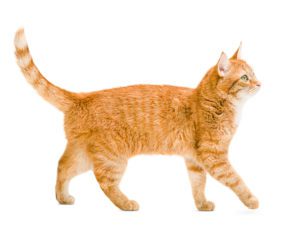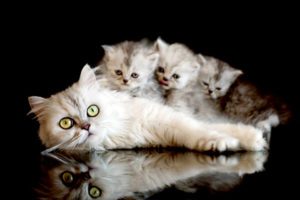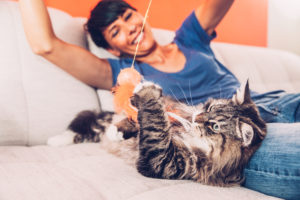Cat Suckling: Why is My Cat Still Trying to Nurse as an Adult?
Cat suckling is often a harmless behavior in cats that makes them feel secure the way they were during kittenhood. However, it can become an issue if your cat is suckling on wool or another material or object they may ingest.
Cats tend to suckle if they are separated from their mother too soon or the nursing process is interrupted. Stress can also be another factor involved in suckling, as there may be disproportionate resources in the home. Certain cat breeds may also be susceptible to suckling.
As you can see, suckling is not just a “kitten behavior.” If you have an adult cat who is suckling, take a look at the information below.

What is Cat Suckling?
Suckling refers to nursing. When kittens suckle, they usually kneads their mother’s underbelly to procure the milk. As kittens age, they are weaned off their mother’s milk and gradually transition to solid food. Kittens may also suckle on themselves or a variety of objects. Some of the common places where cats suckle:
- The fur on the belly of other kittens
- Genital area of other male and female cats
- On bedding and stuffed toys
- The fingers or skin of their pet parent
The suckling could occur with their nipples, other areas of their skin, or objects like a piece of fabric or their favorite toy. Cat suckling is not just limited to kittens, either. Sometimes full-grown cats suckle, and there can be an assortment of explanations for this.
Harmful, non-productive suckling behavior tends to occur when kittens are orphaned at two to three weeks. About half of all orphaned kittens at this age suckle on each other. This behavior is typical because these orphaned kittens have first experienced suckling on their mother.
The situation can actually become dangerous. Damaged tissue on the kitten being suckled can be harmful, as their genital areas can become swollen or traumatized, and the kitten may not be able to urinate, which can quickly become a life-threatening situation.
What Are the Reasons Why Cats Suckle?
Cat suckling or nursing behavior usually occurs in kittens before they are weaned off their mother’s milk. However, there can be instances where a kitten or adult cat may want to continue to “nurse,” such as stress or breed disposition. Your cat could also be experiencing a wide array of dilemmas. The following include some of the explanations why your cat may be suckling.

The Nursing Process is Interrupted
If a kitten is separated from their mother shortly after birth, the weaning process is interrupted. Kittens should not be disconnected from their mothers earlier than six to twelve weeks of age. This separation can cause all types of concerns for the feline youngster. Cats who suckle after weaning is not unusual. Suckling makes your cat feel secure, just like when they were a kitten with their mother.
Your Cat Sees You as Their Mother
If you have a cat that is suckling on you, it means that they see you as their mother and have imprinted this behavior onto you. Being separated from their mother early may have been confusing and scary, and in their adorable, slow-blinking eyes, you are a source of comfort and security. They see that you love and care for them, which makes them think you are their mother.
Your Cat is Stressed
A stressed cat can sometimes display obsessive-compulsive behaviors, including cat suckling. Separation anxiety can be the culprit. If you see that your cat starts excessively meowing, eating too fast, or excessively self-grooming, they may be experiencing separation anxiety. Signs of stress in cats can be easy to miss, as they are independent are good at hiding their emotions. Other symptoms of stress include:
- Pooping or peeing outside the litter box
- Hiding more than usual
- Hissing or growling
- Vomiting or diarrhea
If your feline is stressed out, they could also suck their paws or chew their tail. These are behaviors that can occur in conjunction with suckling. If your cat is suckling, and you see any of the above signs, you may have a very stressed-out kitty on your hands.
It is a Biological Instinct
The impulse to suckle happens in early kittens. However, that instinct can also arise in older kittens and cats. There are certain types of materials that adult cats may suckle. It is similar to the way a child persists in sucking their thumb past the age of four. It is an instinct that inhabits them, whether for comfort or as a response to a stressful situation.
It is in the Genes
Some breeds are more prone to suckling. Wool-sucking is a common occurrence in certain breeds. Wool suckling is when a cat sucks on items like blankets, pieces of clothing, fuzzy toys, or even the carpet. The reasons for wool suckling tend to be the same as when they try to nurse on you. The following include the breeds that tend to suckle:
- Angora
- Burmese
- Domestic shorthair
- Norwegian forest cat
- Siamese
- Turkish Van
Oriental breeds are said to be more likely to suckle, as they require a more extended weaning period than most types of cats. The breeds with the lowest tendency to suckle are Persians and Russian Blues. You must be careful and watch your cat to ensure that they do not swallow something they cannot digest when suckling on objects, as it could result in an obstruction.
How Can I Support My Feline Who is Suckling?
Since there are many possible reasons your cat is suckling, the solution should correspond with the direct issue causing it. You want to discover what would be best for your cat since harmful suckling can lead to a partial or complete blockage in the intestines. There are a plethora of different ways you may be able to help.

Make Sure Your Cat Has Adequate Resources
If your cat is suckling because they are stressed, it may be due to a lack of resources in the home. Be sure to have enough eating, sleeping, and potty areas for your cat, especially if you have a multi-cat household. Also, it is important to make sure there are enough cat trees for them to climb and give each cat equal attention.
Give Them Mental Stimulation
Make sure your cat gets enough mental stimulation. If your cat is occupied and you provide some enrichment, they will not become bored and turn to suckle. Take the time to play with your feline companion, make sure they exercise, and give them food puzzles to stimulate them.
Help to Relieve Their Stress
You can use sprays, wipes, or diffusers containing pheromones to relieve your cat’s overall stress levels. Feliway cat calming pheromone diffuser is a natural solution that mimics your cat’s facial pheromones. This diffuser is a great product that can decrease stress in your cat and help them calm down.
Consider Medication
If nothing else works, you can consider medication for your cat. This measure should only be taken if the suckling behavior becomes destructive and harmful to them. If all else has failed, carefully consider medication. Talk to your vet to find out if medication would be appropriate and help to control the suckling behavior.
Conclusion
There are many possible explanations for nursing or suckling behavior in adult cats. Although it can be a harmless behavior, it is best to redirect your cat and find out the root cause as to why they are suckling.
If you have any questions, Lake City Animal Hospital is here to help! Give us a call at (386) 755-0236 or make an appointment online!

